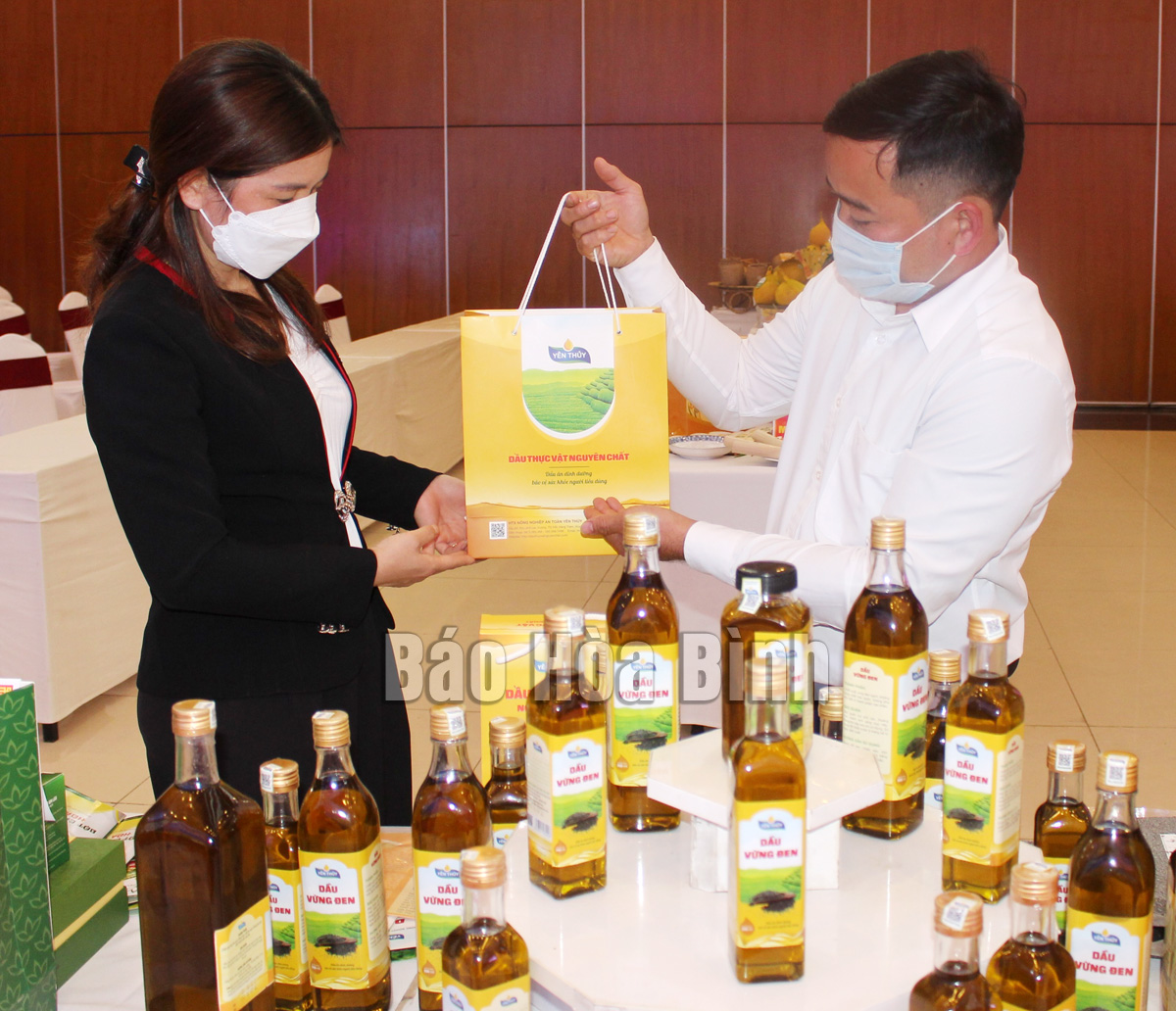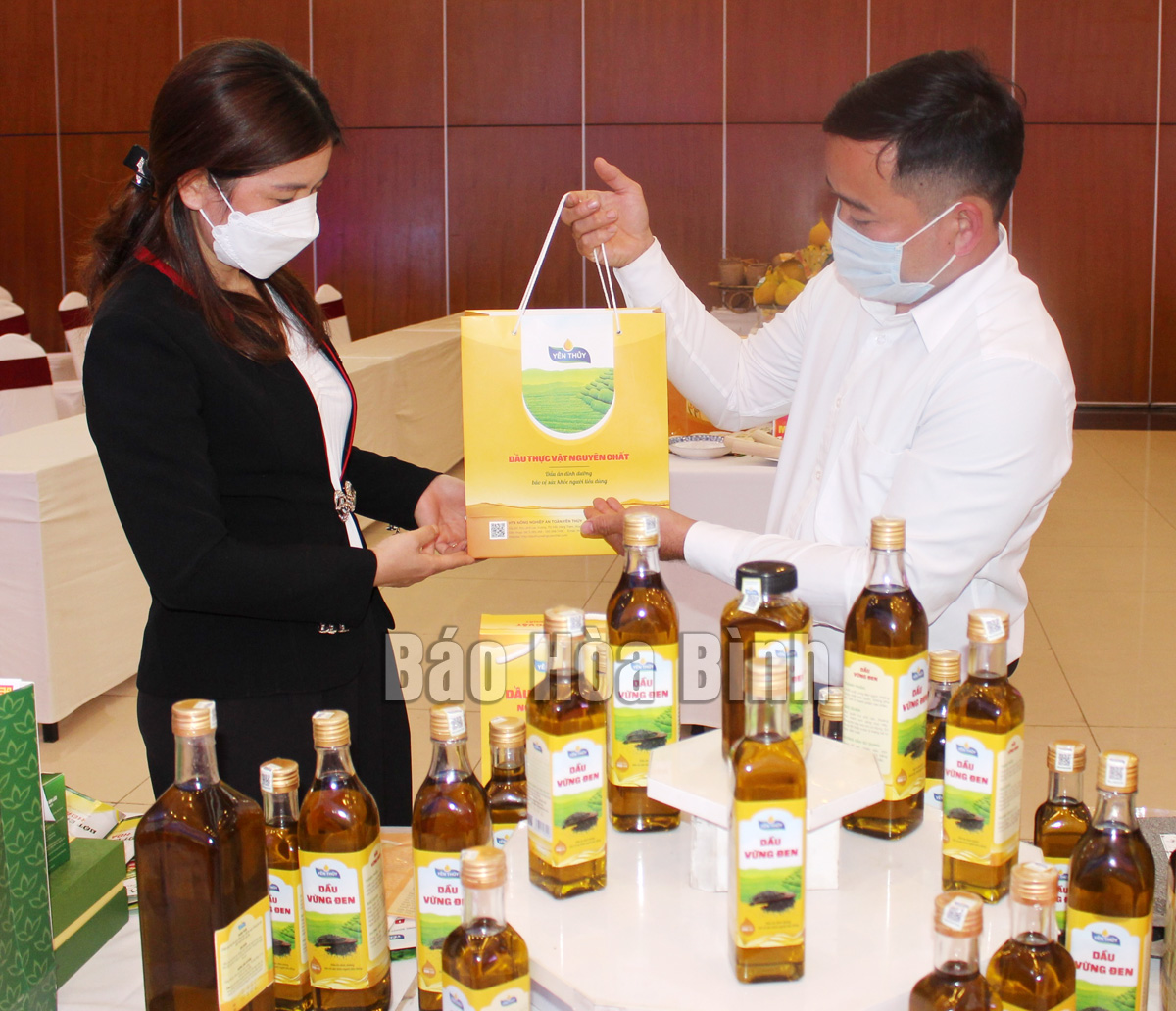
(HBO) - Makers of OCOP (One Commune, OneProduct) products in Hoa Binh are stepping up production to meet the surging consumption demand in the upcoming Lunar New Year (Tet) festival.
Besides raising output, they are also working to diversify sales channels for their products.
Farmer members of theYen Thuy safe agricultural cooperative in Yen
Thuy district are packing OCOP products into gift packages to meet the demand
of consumers in the upcoming Lunar New Year festival.
During the past three months, members of the Phu Cuong - Song Da agricultural
product production and processing cooperative have been diligently taking care
of their banana growing farms along the Da River, in order to ensure an
adequate supply for the market during the Tet festival.
According to vice director of the cooperative Tran Van Tu, in recent years,
consumers prefer to use traditional OCOP products of the locality. The cooperative has prepared 200 tonnes of bananas to meet the supply during
the festival, he said.
Banana products of the cooperative meet the provincial-level 3-star OCOP and VietGAP
standards. They are mainly exported to China. Cao Phong district is famous for many typical OCOP products such
asoranges as luxurygiftsof the3T Cao Phong agricultural
cooperative, fresh fermented orange juice,orange juiceand
marmalade, honey peach lemon tea and orange wine of the Ha Phong cooperative.
According to Bui Van Dan, head of the Department of Agriculture and Rural
Development of Cao Phong district, during thelead-up to Tet, the demand
for OCOP products increases strongly, especially for fresh orange.
Hoa Binh so far has 100 provincial-level OCOP products, with 22 products rated
as four stars, and 78 asthreestars. To promote consumption of OCOP products amid the pandemic, suppliers have
adopted online sale methods and introduce their products on e-commerce
platforms such as Voso.vn and Posmart.vn.
Most OCOP products of Hoa Binh have been introduced and sold at farm stores,
shoppingmalls and supermarkets, retail agents in the locality and in big
cities including Hanoi, Ninh Binh, Nam Dinh and Hai Phong. Local suppliers and
producers have also paid attention to developing trademark of OCOP products.
/.
According to data from the Hoa Binh Provincial Party Committee, the industrial production index for the first six months of 2025 is estimated to have increased by 20% compared to the same period last year. This marks the highest year-on-year growth rate for this period since 2020.
In the first six months of 2025, Hoa Binh province’s export turnover was estimated at 1.145 billion USD, marking an 18.11% increase compared to the same period in 2024. Import turnover was estimated at $ 804 million, a 17.15% increase, which helped the province maintain a positive trade balance.
The lives of the ethnic minority farmers in Tan Lac district have gradually improved thanks to the new directions in agricultural production. This is a testament to the collective strength fostered through the professional associations and groups implemented by various levels of the district’s Farmers’ Union.
With the motto the "product quality comes first,” after nearly one year of establishment and operation, Muong village’s Clean Food Agricultural and Commercial Cooperative, located in Cau Hamlet, Hung Son Commune (Kim Boi district), has launched reputable, high-quality agricultural products to the market that are well-received by consumers. The products such as Muong village’s pork sausage, salt-cured chicken, and salt-cured pork hocks have gradually carved out a place in the market and they are on the path to obtaining the OCOP certification.
In the past, the phrase "bumper harvest, rock-bottom prices" was a familiar refrain for Vietnamese farmers engaged in fragmented, small-scale agriculture. But today, a new spirit is emerging across rural areas of Hoa Binh province - one of collaboration, organisation, and collective economic models that provide a stable foundation for production.
Maintaining growing area codes and packing facility codes in accordance with regulations is a mandatory requirement for agricultural products to be eligible for export. Recently, the Department of Agriculture and Environment of Hoa Binh province has intensified technical supervision of designated farming areas and packing facilities to safeguard the "green passport" that enables its products to access international markets.



